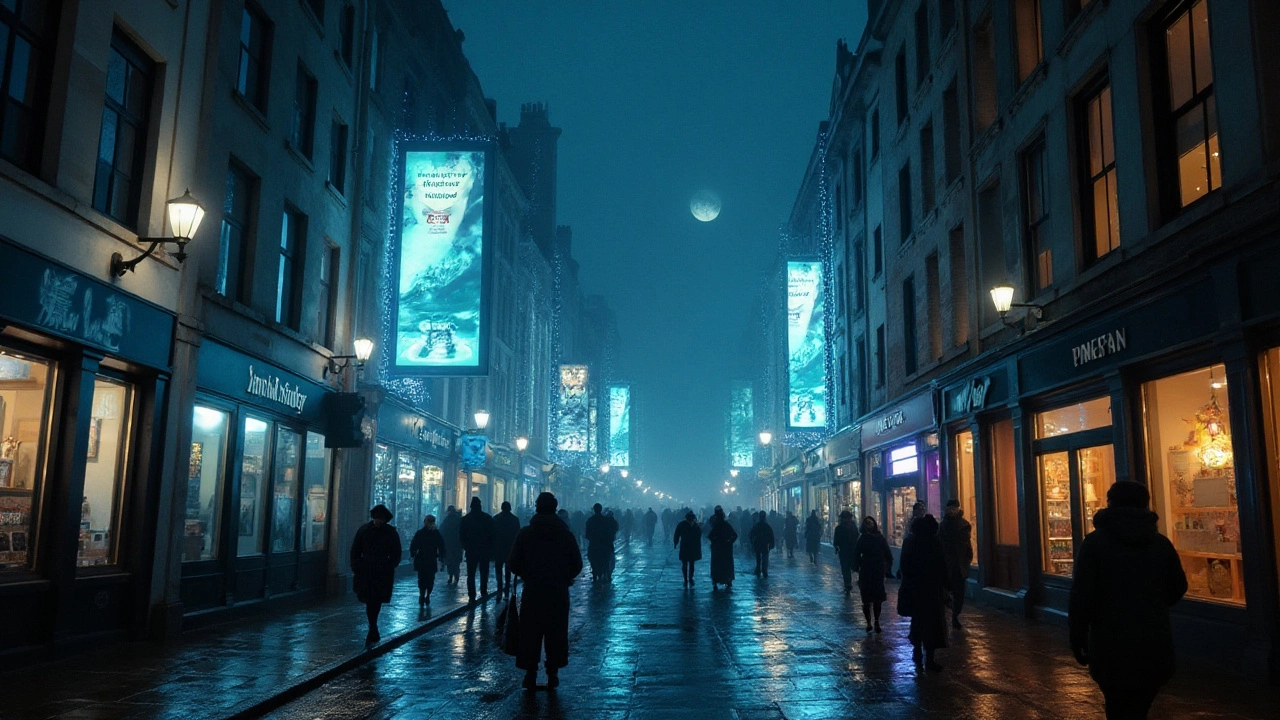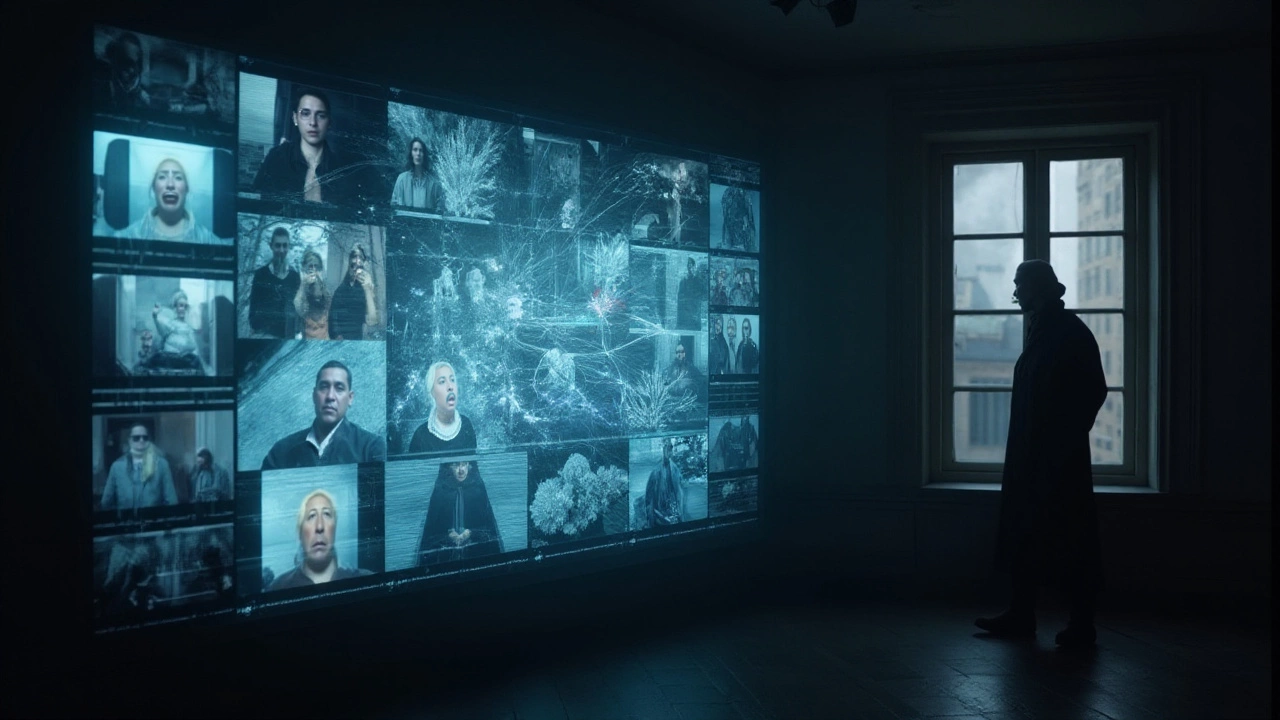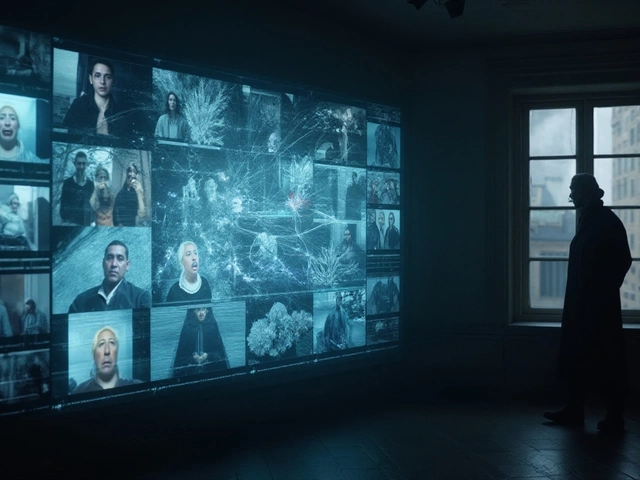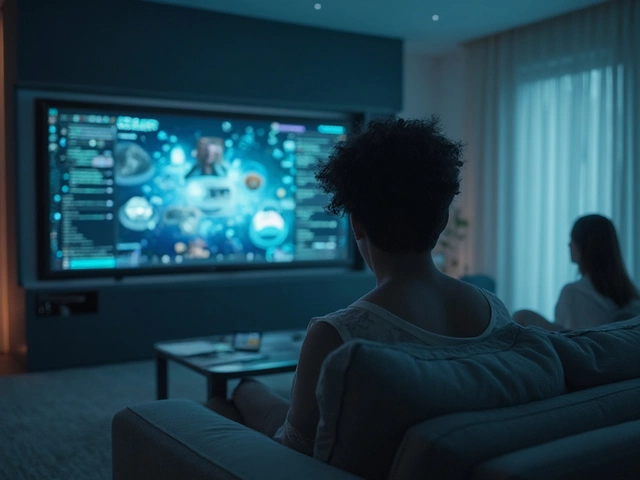'Black Mirror', the dystopian TV series, has carved its niche by holding a stark mirror to the modern world. For years, it has captivated audiences with its eerie scenarios that feel all too feasible as we advance technologically.
In recent times, whispers about its cancellation have stirred curiosity and concern among its fanbase. What might be the reason behind such speculation, and is there any truth to it?
Diving into the current status of 'Black Mirror', this article uncovers what lies behind the rumors. By investigating the social and cultural conversations it has sparked, we aim to understand its significance better and predict where it might head next.
- The Phenomenon of Black Mirror
- Rumors and Speculations
- Official Announcements
- Impact on Pop Culture
- The Future Outlook
The Phenomenon of Black Mirror
Since its inception in 2011, Black Mirror has been more than just another entry in the speculative fiction genre. Created by Charlie Brooker, it quickly rose to fame due to its unique anthology format, each episode comprising standalone narratives that delve into the unforeseen consequences of new technologies. Audiences were drawn to its sharp, often unsettling reflection of society’s relationship with technology, making it a compelling watch across the globe. Each episode presents a twisted reflection of our society’s possible futures, leaving viewers pondering not only the moral and ethical questions raised but also the disconcerting thought of 'what if'. With no recurring characters or ongoing storylines, it offers fresh perspectives in every episode, maintaining viewer intrigue and encouraging discussions long after the credits roll.
What set 'Black Mirror' apart from other shows was its unflinching exploration of the dark underbelly of technological advancement. It mirrored societal anxieties around AI, surveillance, virtual reality, and social media, topics that resonate globally in today’s fast-paced digital world. Episodes like "Nosedive" which critiques social media obsession, or "San Junipero" which explores virtual reality, struck chords with viewers of various backgrounds. It managed to stand out by not just raising questions but doing so in a way that blurred the line between fiction and potential reality. This duality of entertainment and cautionary tale played a significant role in creating the widespread fascination and cultural impact that the series achieved.
As film critic Matt Zoller Seitz aptly noted, "'Black Mirror' is more than science fiction or horror – it's a genre experiment, a mirror reflecting the modern social condition through a dark, four-dimensional lens."
Beyond mere storytelling, 'Black Mirror' became a cultural barometer, often introducing phrases and ideas into the mainstream vernacular. The term "Black Mirror" itself is a nod to the dark screens of our televisions and phones, reflecting us back at our most vulnerable, glued to technological wonders. This is evident in how the show has influenced conversations about technology's role in our lives, sparking debates in classrooms, boardrooms, and dinner tables alike. Not only did it win critical acclaim, but it also spurred innovation and inspired creators across various media. By altering perspectives on reality and technology, 'Black Mirror' successfully transcended the television screen to become a society-shaping force.
Rumors and Speculations
The curious case surrounding the purported cancellation of Black Mirror has ignited numerous discussions across fan forums and social media platforms. These rumors initially surfaced in response to the long hiatus between the latest season and previous episodes, causing fervent fans to wonder about the fate of their beloved show. The gap between releases isn't uncommon in the television world, but for a series so deeply ingrained in technological themes, such delays carry their own hallmarks of suspense.
Recent speculation suggests internal disagreements between producers and distribution networks, though the truth remains shrouded. Some speculate that the evolving societal context may introduce challenges in crafting narratives that are fresh yet close to the eerily prophetic nature for which the show is known. This series doesn't just predict the future; it has become integral to the conversation about how we envision it.
Adding fuel to the fire, leading actors from earlier seasons have voices quiet yet potent concerns over the pressure and responsibility such storytelling imposes. The whispers have even reached respected media outlets, leading 'The Guardian' to question the feasibility of maintaining a show entwined between fiction and impending reality. As penned by a critic, the challenge lies in knowing "when the satire becomes too close for comfort," reflecting on the series' profound societal impact.
In terms of production, another angle points to resource allocation, underscored by the fact that similar thematic series might be in development by competing platforms. If true, the competition might either hasten 'Black Mirror's return or stall it as new contenders emerge. These unseen forces add layers to the suspense, leaving audiences with more intrigue than answers.
Even without confirmation of its return or cancellation, the media buzz and speculation highlight the show's significant cultural contribution. Its absence from the production timeline hasn't dulled its impact; instead, the absence lingers like a foreboding pause. For a series renowned for unsettling reflections, the uncertainty itself has taken on a narrative eerily reminiscent of its episodic arcs. The question remains whether Black Mirror will once again light up screens with its unsettling tales or remain an iconic flashpoint in cultural nostalgia.

Official Announcements
The fate of Black Mirror is a topic that has intrigued fans and critics alike, creating a swirl of speculation about whether it’s canceled or poised for more revelations. As of January 2025, there has been no definitive word from the series' creators or the network regarding an official cancellation. The last known season aired in 2023, leaving avid viewers on tenterhooks for any updates from the showrunners. They have remained characteristically enigmatic, often teasing the possibility of a return without committing to any definitive timelines.
The show’s creator, Charlie Brooker, has been characteristically cryptic when pressed for details about upcoming seasons. In a past interview with the BBC, Brooker noted that he often reflects on contemporary technological advances as inspiration, saying, "Every new headline is a potential plot for the next episode." Such statements keep the buzz alive, suggesting that as long as technology progresses, the showrunners may not be devoid of material worth exploring. This coy approach is typical of a series renowned for its unpredictability and innovative storyline arcs.
What adds an intriguing layer to the mystery of Black Mirror's status is the show's unique production pattern, which has always been unconventional. Unlike other TV series that adhere to a predictable yearly release schedule, Black Mirror's seasons drop unexpectedly. This unpredictability mirrors the themes the show tackles, making any formal announcement even more elusive and exciting. This methodology has enabled Black Mirror to maintain a fresh approach, keeping its content timely and resonant with the current socio-tech climate.
Additionally, discussions about the series have been ripe with talk of potential spin-offs and adaptations, fueling debates on and offline. Enthusiasts have noticed that Black Mirror’s enduring popularity leaves the door open not just for new episodes but also expansive possibilities such as interactive experiences or franchise expansions. While these angles remain unconfirmed by official sources, they illustrate the enormous cultural impact and versatility of the show's format.
It’s also worth noting the impact of emerging streaming platforms that could influence future announcements about Black Mirror. With companies constantly competing for innovative content to attract viewers, the landscape seems fertile for a resurgence of the series in any number of forms. This strategic shift could lead to announcements that leverage the digital-age viewing habits, ensuring Black Mirror continues to find its place in the hearts and screens of a global audience.
Impact on Pop Culture
'Black Mirror' has entrenched itself deeply into our cultural conscience. From its inception, the series not only entertained but provoked reflection, nudging viewers to question their relationship with technology. It’s not just another sci-fi show; it presents a grim, yet fascinating examination of a possible future, where our deepest insecurities intersect with our most advanced creations.
The socially relevant narratives portrayed in 'Black Mirror' episodes like 'Nosedive' and 'San Junipero' have gone beyond mere entertainment. 'Nosedive's' exploration of a social credit system eerily mirrors current societal trends, such as the actual social credit systems being implemented in parts of the world. Through these mirrors, the series offers a space for discourse, making us more wary and, at times, appreciative of the technologies entwined with our daily lives. Its influence has even seeped into educational discussions and think-tank debates about the ethical implications of advanced technology.
Numerous creators in various fields have cited 'Black Mirror' as a critical inspiration. Filmmakers and writers have drawn from its themes to forge narratives that challenge and captivate worldwide audiences. Even in music, artists have referred to its bleak outlook on the future, using it as a metaphor in lyrics and videos. The satirical yet prophetic nature of the show has led to a range of parodies and adaptations, spanning platforms and genres, each attempting to capture the essence of its unnerving foresight.
Perhaps one of the most significant impacts of 'Black Mirror' is its penetration into academic discourse. Theories explored in the series often serve as case studies in research papers and university courses dealing with media studies, sociology, and technology ethics. According to a study from the University of California, close to 45% of surveyed students reported engaging in classroom discussions sparked by episodes of the show, illustrating its role in furthering critical thought through popular culture.
"'Black Mirror' isn't just a critique of technology; it is a reflective lens on our attitudes and the ever-blurring line between humanity and its creations," says Dr. Sarah Lewin, a cultural analyst and author.
In today's rapidly evolving digital era, few shows have managed to imprint as strongly on the collective mindset as 'Black Mirror'. It stands as both a warning and a muse, daring its audience to envision different paths and cautions of promising technological horizons. Its continued relevance in pop culture ensures that its narratives will echo, influencing creators, thinkers, and critics alike for years to come.

The Future Outlook
When it comes to predicting the fate of Black Mirror, one must consider both the current television landscape and the evolving role that technology plays in our society. As digital platforms continue to dominate the entertainment industry, there is a palpable shift towards content that challenges and provokes thought. This change aligns perfectly with what 'Black Mirror' has been offering, indicating that there could still be room for its unique storytelling. Fans continue to demand stories that not only entertain but also inspire reflection on our rapidly changing world.
Looking at the show's trajectory, it's clear that its creators have never hesitated to push boundaries. This commitment to exploring the unsettling sides of our digitized lives ensures that 'Black Mirror' maintains its relevance, even as rumors regarding its status swirl. The show's nature—predictive, reflective, and at times, prophetic—means that any new installment could draw from a multitude of contemporary issues we face today. These include the ethics of artificial intelligence, privacy in a heavily surveilled society, and the implications of virtual reality and augmented reality.
An insight from the show's creator, Charlie Brooker, during a past interview sheds light on his vision for the series: "Black Mirror is all about our own personal relationship with technology and how it changes—sometimes for the worse."
"We never really know where the ideas might lead us, but that unpredictability is exactly what makes it such an exciting project," Brooker reassured his audience.His approach, focusing on innovation and surprise, suggests that any future episodes would likely continue this trajectory of examining the pressing technological narratives influencing our lives.
It is critical to note that creativity often finds itself at odds with commercial realities. Nevertheless, with streaming services hungry for original and captivating content, the likelihood of a revival or continuation cannot be entirely dismissed. 'Black Mirror's' cult status and dedicated fan base provide a foundation for negotiation, ensuring that if the series were to return, it could potentially explore untold stories that resonate deeply in these technologically turbulent times.
Popular speculation also suggests that future episodes could leverage contemporary storytelling techniques such as interactive narratives, akin to 'Bandersnatch,' which allowed viewers to choose their own adventure path. This aligns with the ongoing trends in the entertainment sector, where audience engagement is as crucial as the story itself. The potential for such innovation is almost limitless; it would harness cutting-edge technology both as a theme and a medium, promising a uniquely immersive experience that stays true to 'Black Mirror's' essence.


